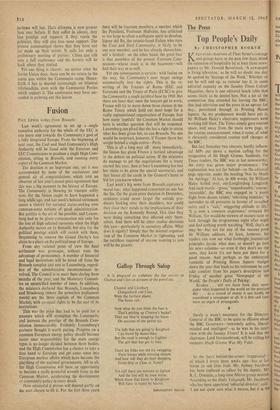Fusion
PAUL LEWIS writes from Brussels :
Last week's agreement to set up a single executive authority for the whole of the EEC is one more step towards the Community's goal of a fully integrated Europe. From the beginning of next year, the Coal and Steel Community's High Authority will be fused with the Euratom and EEC Commissions to produce a single High Com- mission, sitting in Brussels, and running every aspect of the Common Market.
The decision is an important one, yet it was accompanied by none of the excitement and general air of congratulations which told an observer of last year's cereal price agreement that this was a big moment in the history of Europe. The Community is blowing its trumpet softly now, for the fusion ought to have happened a long while ago, and last week's belated settlement seems a victory for national status-seeking over common-sense notions of good administration. But politics is the art of the possible, and Luxem- burg had to be given compensation not only for the loss of high salaried eurocrats when the High Authority moves on to Brussels, but also for the political prestige which will vanish with them, threatening to remove the Grand Duchy's last claim to a place on the political map of Europe.
From any rational point of view the final settlement was grotesque, without even the advantage of permanency. A number of financial and legal institutions will be hived off from the Brussels complex and sent to Luxemburg, regard- less of the administrative inconveniences in- volved. The Council is to meet there during three months of the year, and the Monetary Commit- tee an unspecified number of times. In addition, the ministers declared that Brussels, Luxemburg and Strasbourg (where the powerless parliament meets) are the three capitals of the Common Market, with co-equal rights to be the scat of its institutions.
This was the price that had to be paid for a measure which will strengthen the Community and increase the prestige of the Brussels Com- mission immeasurably. Evidently Luxemburg's partners thought it worth paying. Progress on a common European energy policy should become easier once responsibility for the main energy types is no longer divided between three bodies, and the High Commission has a chance to take a firm hand to Euratom and get some sense into European nuclear affairs which have become the plaything of the national governments. All in all, the High Commission will have an opportunity to become a really powerful seventh force in the Common Market, accelerating the development of community policy in every detail.
How successful it proves will depend partly on the men chosen to fill it. For the first three years there will be fourteen members, a number which the President, Professor Hallstein, has criticised as too large to allow a collegiate spirit to develop. Signor del Bo, the satanic-faced Italian who runs the Coal and Steel Community, is likely to be one new member, and he has already shown him- self a fireball : on the other hand, the great fear is that members of the present Euratom Com- mission—whose stock is in the basement—will find their way in as well.
Yet one consequence is certain : with fusion on the way, the Community's next target swings automatically into the sights. This is the re- writing of the Treaties of Rome (EEC and Euratom) and the Treaty of Paris (ECSC) to give the Community a single juridical base by 1969. But there are fears that, once the lawyers get to work, France will try to water down those clauses in the Rome Treaty which hold out most hope for a really supranational organisation of Europe. Just how many 'capitals' the Common Market should have is another question that will be reopened. Luxemburg can plead that she has a right to retain what has been given her, as can Brussels. No one would be surprised, however, if France threw her weight behind a single centrc—Paris.
This is all a long way off : more immediately, the fusion has given France a tactical advantage in the debate on political union. If the ministers do manage to get the negotiations for a treaty started this year, then at least Luxemburg has lost her claim to be given the special secretariat, and that leaves all the cards in the General's hand to bid for you-know-where.
Last week's big news from Brussels contains a moral too : what happened concerned no one but the Six. On the grain price decision in December, ministers could never forget the outside pro- ducers looking over their shoulders, nor could they close their minds to the implications of their decision on the Kennedy Round. This time they were doing something that affected only them- selves. And there will be other similar decisions this year—particularly in monetary affairs. What does it signify? Simply that the internal organisa- tion of the Common Market is tightening, and the sacrifices required of anyone wanting to join will be the greater.


































 Previous page
Previous page